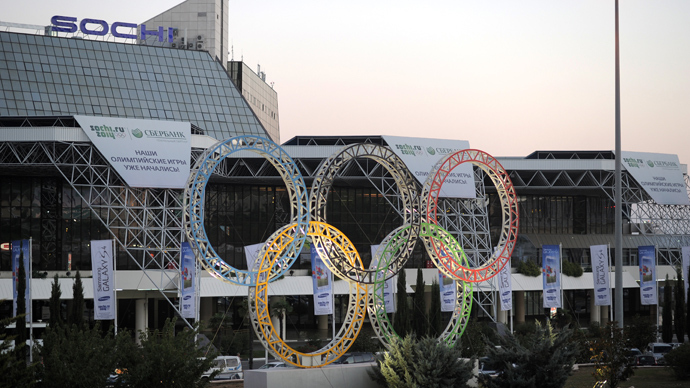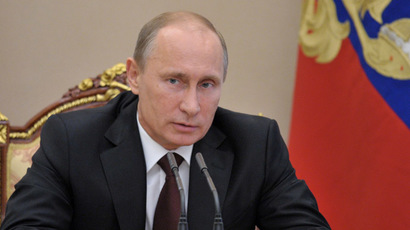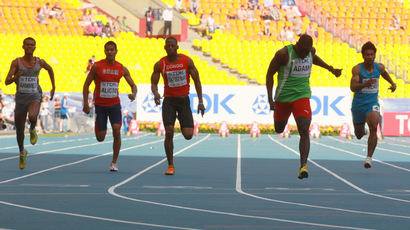Sochi, Sport and Security: Russia bans protests during Winter Olympics, limits access

Along with other measures to ensure security during the 2014 Winter Olympics, Russian President Vladimir Putin has signed a decree that bans any protests and limits access to the city, thus sparking public concern.
The official government newspaper, the Rossiyskaya Gazeta, published the presidential decree on Friday.
The edict includes security measures such as limited access into Sochi for the time of the Olympics: only cars with local license plates, emergency vehicles and those accredited by the Olympics organizers will be allowed to enter between January 7 and March 21.
Also, all "gatherings, rallies, demonstrations, marches and pickets" that are not part of the Olympics or the Paralympics will be prohibited in Sochi from Jan. 7 to March 21.
In addition, the decree introduces “controlled zones” that
include Olympic venues, ports, train stations and special road
checkpoints where people’s belongings will have to be checked
before entering.
The decree also bans cars from crossing the border to the Republic of Abkhazia, which is located several kilometers from the Olympic Park.

The Winter Olympics will take place from February 7-23 and the Paralympics will be held March 7-16.
The security aspect of the Winter Olympics is a top priority for
the Russian government considering its close proximity to the
North Caucasus region, which has seen a violent history of
Islamist insurgency.
Jihadists’ threats have already been made. In July Chechen
Islamist militant and the leader of the Islamist insurgency in
the North Caucasus, Doku Umarov called upon militants in a video
to use “any methods” in order to disrupt the 2014 Winter
Olympics.
‘Measure is unconstitutional’
Some rights advocates have said that the decree is intended to prevent demonstrations against Russia's new law prohibiting gay propaganda directed at minors.
Gay activist Nikolay Alekseev told RT that he believes the new
law is unconstitutional and he plans to challenge the ban in
Russia’s Supreme Court next week.
“We believe the measure is unconstitutional … it is unlikely the Russian courts will take our side, but we will take this all the way to the European Court of Human Rights, even if by the time it produces its ruling, the Games will be over,” Alekseev said.
“The functioning of normal laws can be suspended under a
presidential edict, if there is an emergency, or a war. Do the
Sochi Olympics fit these criteria?” he added. “What face
do we want to show to the world? Is it of Russia as an open,
democratic state? Or is it a trip to the Soviet past, to
Moscow-80. Why can’t people be allowed to express their
opinions?”
I will appeal the executive order of Russian President on limitation of freedom of assembly during Sochi Olympics in Russian Supreme Court.
— Nikolai Alexeyev (@n_alexeyev) August 23, 2013
Another activist from Russian human rights group Agora, Pavel Chikov, shared Alekseev's view, but believes the law will be implemented anyway. “In my view the edict contradicts the constitution. But that will make little difference, as it will be complied with anyway,” Chikov told Kommersant newspaper.
A popular Sochi-based blogger, Aleksandr Valov, wrote that this law "will transform the resort city of Sochi to an Olympic concentration camp."
In response to international concerns over the gay propaganda law, Russian Deputy Prime Minister Dmitry Kozak sent a letter to the International Olympic Committee on Thursday, reassuring that Russia would observe the Olympic Charter's provision against discrimination of any kind.
International Olympic Committee President Jacques Rogge responded on Friday saying that he is "comforted" by Russia's assurance.
"We are going to inform now all the national Olympic committees and all the athletes who want to have clarity," Rogge told reporters after addressing the UN General Assembly.

Earlier, the IOC said in the statement that it "received assurances from the highest level of government in Russia that the legislation will not affect those attending or taking part in the Games.”
But, despite that, IOC has its rules pertaining to the Games, where it does not allow participants to make any political gestures.
The international rule was observed during the latest World Athletics Championships held in Moscow, when the Swedish high jumper Emma Green Tregaro painted her fingernails in rainbow colors to support gay rights and had to switch to red nail polish after receiving warning from the track and field governing body, the IAAF.
On Monday, Russia’s sports minister Vitaly Mutko said the controversy surrounding the law prohibiting gay propaganda toward children was “invented” by the media – and promised that no athletes or visitors at the Sochi Olympics would suffer any infringements of their rights.
The legislation, enacted in Russia on June 30, introduces fines for propagandizing non-traditional sexual relations to minors, including in the media and the internet.
Critics of the law say that it discriminates against sexual minorities, as it leaves the loose legal interpretation open to prosecute anyone voicing support for LGBT rights.
However, Russian lawmakers say the law does not intend to violate gay rights, but rather protect minors from non-traditional sexual relationship propaganda.














